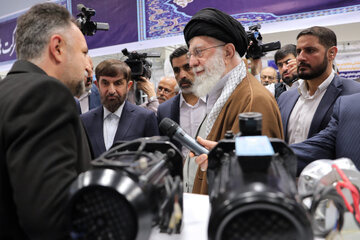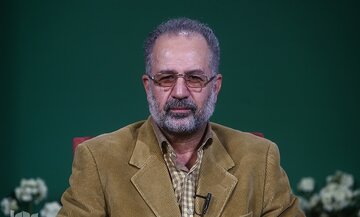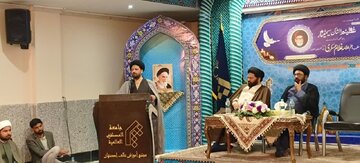AhlulBayt News Agency: A book titled "Safeer E Noor" by Tasleem Reza Khan and translated from Urdu into Farsi has been released in Iran in a bid to shed light on the life and endeavors of the Pakistani figure Syed Arif Hussain al Hussaini.
The book "Safeer E Noor" meaning "The Ambassador of Light" published by Surah Meher Publications, spans 428 pages and explores the biography of Shahid Allameh Syed Arif Hussain al-Husseini.
In two chapters, the book explores a Pakistani Shiite cleric and leader of the Jafariya movement.
In 1967, Arif al-Husseini attended Najaf Ashraf University for religious studies during Imam Khomeini's exile in Iraq, when the Baath Party held power.
In Najaf, he met Imam Khomeini, embraced his ideas, and became both a disciple and a soldier, admiring his jurisprudential, moral, mystical, and political qualities.
After the Islamic Revolution, he represented Imam Khomeini in Pakistan, engaging in cultural, religious, and political activities while addressing the health and economic needs of the people.
His presence in Pakistan fostered a brave figure who supported the vulnerable and opposed colonialism, raising concerns among enemies of the Islamic Revolution.
In 1986,, Allama Arif Hussain al-Husseini was assassinated at the Peshawar School of Islamic Studies by unknown assailants.
In 1994, Reza Khan, a Pakistani resident and colleague of Arif Hussaini, authored "Safeer E Noor," revealing the circumstances of his murder.
This 400-page book not only details Arif Hussaini's biography but also illustrates his Islamic character and resilience.
The book has been reprinted over ten times in Pakistan and translated into Persian by Roya Javadi and Joshua Zafarhayati, with research contributions from the Center for Studies and Research of Culture and Literature of Sustainability.
During Arif Hussaini's time, Reza Khan served as head of the Dera Ismail Khan Department for the Imamate Students' Organization. A pharmacy graduate, he endeavored to accurately portray Arif Hussaini and uncover the truth behind his assassination through interviews, document reviews, and witness accounts.
The book was written in an era devoid of modern social media, requiring the author to travel extensively and endure hardships to gather information.
Allama Arif Hussain al-Husseini was born on November 25, 1946, in Pewar, Parachinar, Khyber Pakhtunkhwa, Pakistan.
He received his early education in a government primary school and completed his matriculation in Parachinar before pursuing religious studies at Madressa Jafria.
He later moved to Najaf for further education and returned home in 1973, marrying before going back to Qom in 1974 to join the Hawza.
While studying in Najaf, he attended prayers led by Imam Khomeini, who was in exile. Despite the risks, he was the only Pakistani who consistently prayed behind Imam Khomeini and attentively absorbed his lectures, sharing insights with fellow students afterward.
His political activism began in Najaf, where he faced harassment from Saddam Hussein's regime but remained undeterred.
Following his attachment to Imam Khomeini, he was ordered to leave Najaf and chose Qom.
His political activities drew the attention of the Shah’s intelligence, resulting in his arrest and torture, yet he persevered. Imam Khomeini granted him a Wikalat Nama, which was seized at the Iran-Pakistan border in 1983 upon his return.
Back in Pakistan, he initiated political activities through speeches in local Shia mosques and established the Shaheed Foundation to support martyr families.
In mid-February, the book launch of Safeer E Noor was held in Tehran with Iran's religious scholars in attendance.
During the ceremony, the Head of the Islamic Development Organization (IDO) Hojjatoleslam Mohammad Qomi attached importance to the personality of the Pakistani figure.
He said that Arif strived to promote real Islam among Muslims, calling for further introducing this figure.
....................
End/ 257






Your Comment